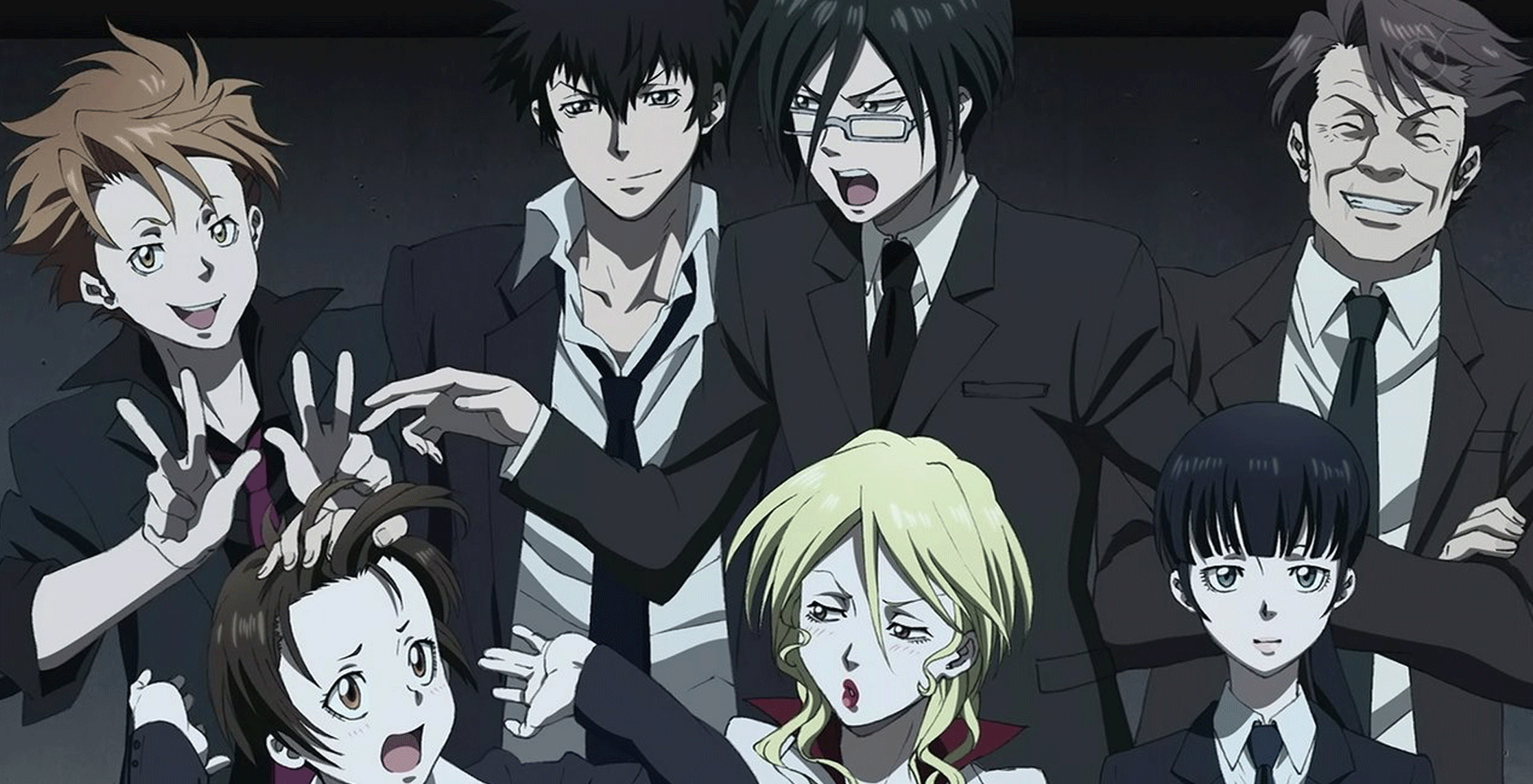In a dystopian future, your life’s direction is decided for you. No longer do humans need to worry about things like their career, every person’s aptitude for different tasks benefiting society is decided by a central computer. This computer is constantly scanning and reassessing people, determining their likelihood to benefit society, or to worsen it. As a computer, it has limited means with which to physically affect the world though, and this is where we take on a role as an inspector or enforcer. Enacting the system’s will for the betterment of society.
Set in the same universe as the popular anime series, Mandatory Happiness joins the visual novel genre, one of niche popularity alongside games like Danganronpa, Zero Escape and Phoenix Wright. Mandatory Happiness sticks much closer to the traditional visual novel formula than those aforementioned series however. There are no logic puzzles, no trials, no action elements whatsoever. Instead, Mandatory Happiness plays much more like a ‘Choose Your Own Adventure’ novel. This isn’t necessarily a bad thing, but something worth knowing before going in. Told from the point of view of an Inspector or an Enforcer, depending on which character you choose at the outset, Mandatory Happiness delves into some fairly heavy themes during even it’s initial chapters and does so in a way that doesn’t feel cheap or tokenistic. The aforementioned AI system, Sybil, will judge the people you meet, and order that they be allowed to live, be forced into mental rehabilitation if they are not yet lost, or be Eliminated if they are deemed a threat to society and beyond recovery. The morality of offloading life or death decisions to an all-knowing computer is one of the most exciting elements of Psycho Pass’s story and will be familiar to fans of the show.
Told from the point of view of an Inspector or an Enforcer, depending on which character you choose at the outset, Mandatory Happiness delves into some fairly heavy themes during even it’s initial chapters and does so in a way that doesn’t feel cheap or tokenistic. The aforementioned AI system, Sybil, will judge the people you meet, and order that they be allowed to live, be forced into mental rehabilitation if they are not yet lost, or be Eliminated if they are deemed a threat to society and beyond recovery. The morality of offloading life or death decisions to an all-knowing computer is one of the most exciting elements of Psycho Pass’s story and will be familiar to fans of the show.
The game does throw a lot of terminology at players and to a degree assumes some familiarity with the world. It’s not obtuse enough that you won’t be able to make sense of things, but for people entering this world for the first time, a detailed reference is kept in the pause menu which will clarify any topics or entities mentioned during story scenes to make sure you’re not left in the dark. After opening strongly, I was disappointed with how the game’s main story progressed. The opening chapters present some incredibly interesting moral quandaries but the central plot that is revealed a little further in is far more predictable, cliche and shallow in comparison. It’s hard to explain my reasoning without discussing the plot and ruining it for anyone, but I found the major revelations in the storyline utterly predictable and painfully signposted. It might just be because things began in such a thought-provoking manner, but the central theme of ‘mandatory happiness’ just felt sterile.
After opening strongly, I was disappointed with how the game’s main story progressed. The opening chapters present some incredibly interesting moral quandaries but the central plot that is revealed a little further in is far more predictable, cliche and shallow in comparison. It’s hard to explain my reasoning without discussing the plot and ruining it for anyone, but I found the major revelations in the storyline utterly predictable and painfully signposted. It might just be because things began in such a thought-provoking manner, but the central theme of ‘mandatory happiness’ just felt sterile.
The bulk of your time will be spent reading, characters interact through sparsely animated dialogue sections and inner monologue. Occasionally during chapters you will be faced with a choice which could possibly have an effect on your story’s direction entirely, or affect how favourable another character will behave towards your character. The game doesn’t force you to make split second decisions like The Walking Dead, but the kinds of decisions you will make feel similarly morally ambiguous. The decisions can lead to an early end though so make sure to save regularly, there are no checkpoints or auto-saves. The game’s dialogue is almost entirely voice acted by the Japanese cast of the anime, which does help the game feel right at home as part of the greater Psycho Pass world. I often found that I read fast enough that I would interrupt voice lines by skipping to the next piece of dialogue. This is mildly jarring, but every character’s dialogue can be turned on or off, or have volume adjusted individually so it’s an issue easily rectified. Dialogue is accompanied by artwork of the characters speaking, but there isn’t much variety in their animations. Most characters have only a few poses and facial reactions throughout the game which really don’t do much to enforce the story they’re part of. Dramatic events can have their impact entirely lost when characters on screen barely react beyond a slight smirk. Characters fade in and out as their lines begin and end, which slows down progress of dialogue. It’s something that like the skipping dialogue you can get used to, but was a mild annoyance throughout the game.
The game’s dialogue is almost entirely voice acted by the Japanese cast of the anime, which does help the game feel right at home as part of the greater Psycho Pass world. I often found that I read fast enough that I would interrupt voice lines by skipping to the next piece of dialogue. This is mildly jarring, but every character’s dialogue can be turned on or off, or have volume adjusted individually so it’s an issue easily rectified. Dialogue is accompanied by artwork of the characters speaking, but there isn’t much variety in their animations. Most characters have only a few poses and facial reactions throughout the game which really don’t do much to enforce the story they’re part of. Dramatic events can have their impact entirely lost when characters on screen barely react beyond a slight smirk. Characters fade in and out as their lines begin and end, which slows down progress of dialogue. It’s something that like the skipping dialogue you can get used to, but was a mild annoyance throughout the game.
CONCLUSION
There’s a lot of story here for those looking to delve further into the Psycho Pass world. Two characters give two different points of view from which to follow the storyline, and there are a bunch of endings and story directions that can be taken depending on the choices made along the way. I suspect Mandatory Happiness might be more appreciated by someone already immersed in the franchise, who has been eagerly awaiting more perspectives into the authoritarian dystopia of 2112, but as someone only tangentially familiar with the show I found that the story made promises of exploring the social impact of a world dictated by an all knowing computer only to instead focus on an uninspired side story. If you’re interested in the setting the Psycho Pass anime is definitely a better place to start, and for someone looking to play a visual novel style game there are many out there more enjoyable than this. Mandatory Happiness is one for the fans only.
The PlayStation Vita version of this game was primarily used for the purpose of this review.



